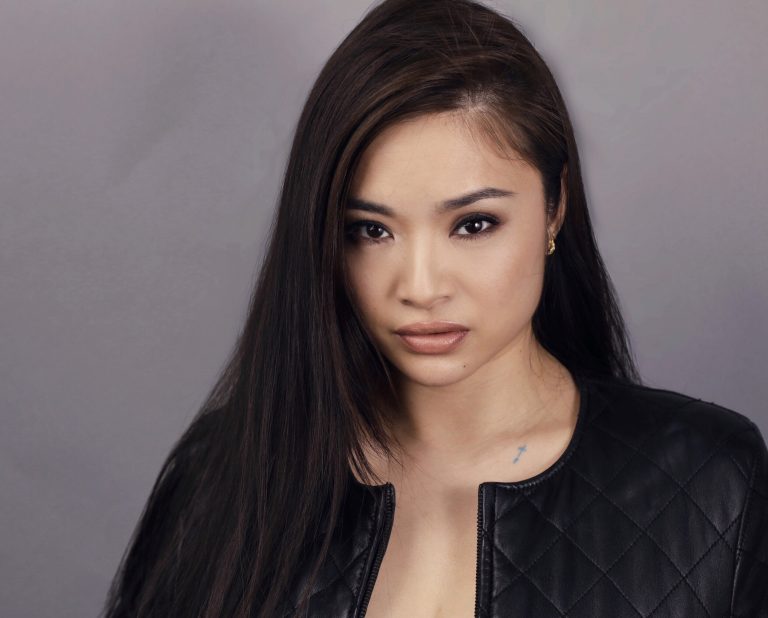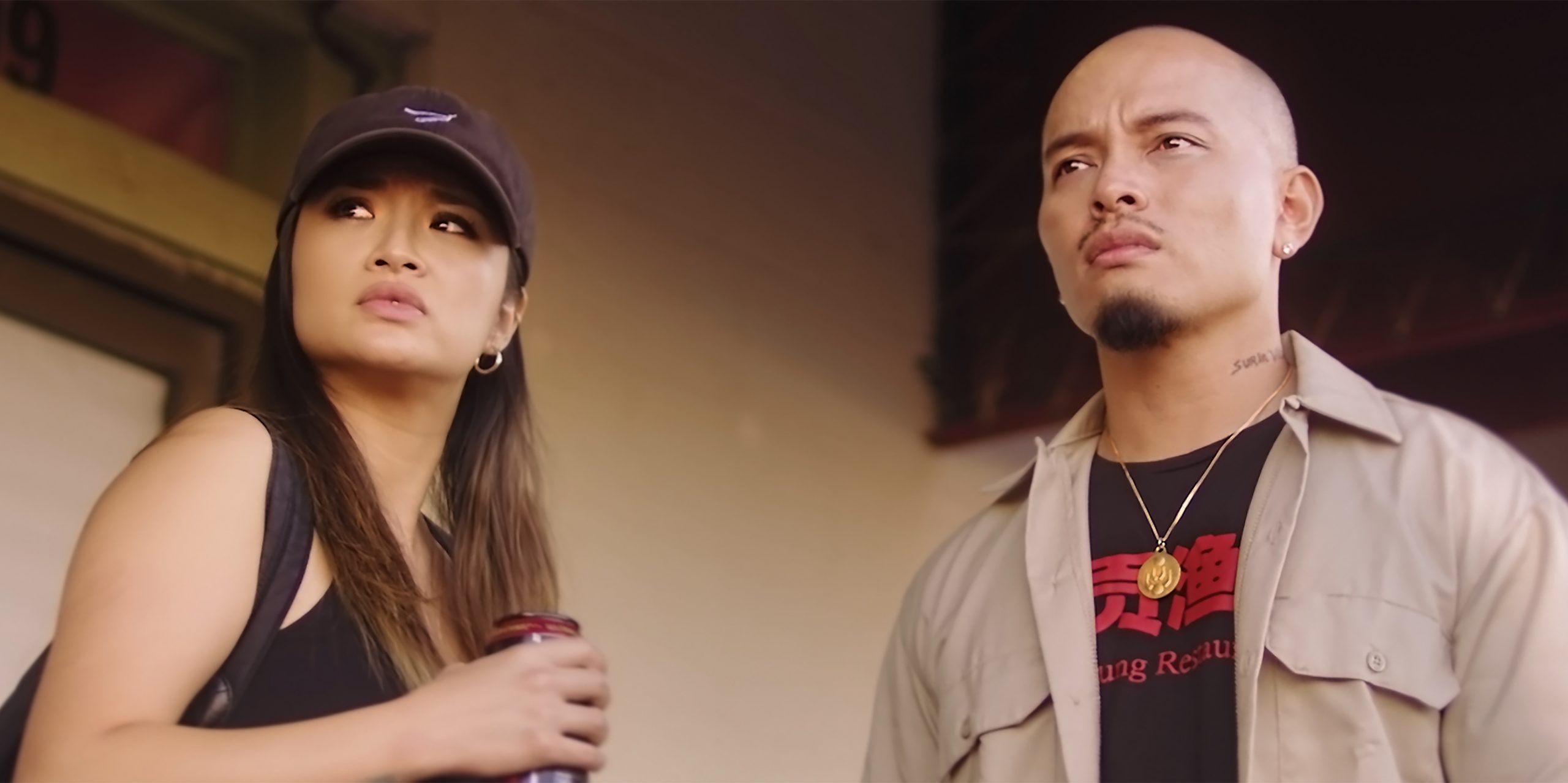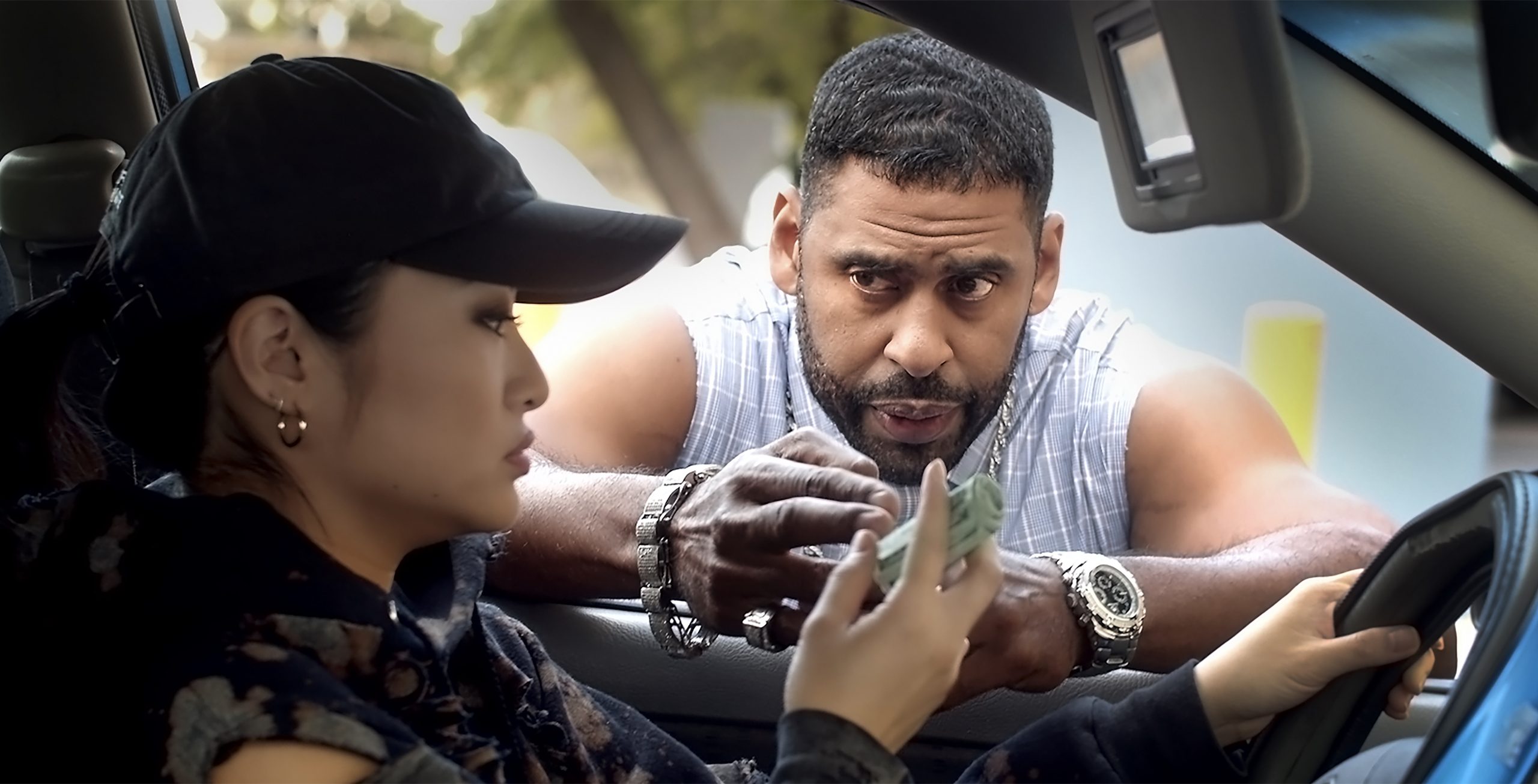
Story: Tera Wong(Hedy Wong) delivers Chinese food for her mother’s struggling restaurant located in a territory referred to as the “Low Bottoms” in south central Los Angeles. And everyone around her, including her unpredictable brother Saren(Lorin Alond Ly), are financially trapped in this crime and violence-ridden neighborhood. That is until Tera takes a job from a local drug lord, moving “product” inside her takeout food containers. With the cash rolling in, Tera intends to move the family restaurant to the suburbs and go clean. But after a series of tragic events, the dream that Tera built on a foundation of lies, may just crumble.
It’s rare to have an interview with an Asian actress who plays a leading role in a serious drama. I had an opportunity to interview an actress/screenwriter Hedy Wong for her latest outing, “Take Out Girl.”

An Exclusive Interview with Hedy Wong
Q: This is based on a true story and, at the end of the film, is dedicated to your family. How much of this was inspired by events in your life, and what elements of the story were difficult to bring to the screen?
H.W : Many of the characters were based on people I know. We left the mother’s name unchanged in the movie (Wavy) as an homage to my real mom. Nate is also based on a good friend of mine. The real Nate makes a cameo in the movie and trailer–he is the shirtless man standing on the balcony looking down on me as my character walks through the neighborhood. I was really happy that Nate made it to set that day for that scene. My parents really ran a Chinese restaurant in the Bay Area pretty much all my life. I can bus a 12-top table with lightning speed. The difficult part for me is answering questions about the criminality aspect from the story in relation to my life in interviews because I’ve gotten in trouble with the police in the past.
Q : This film is based on the area referred to as “Low Bottom” which is in South central LA. What are the preconceived notions people have about that area, and what are the great things about the area that stood out for you enough that you wrote about it in your script? Can you include your own personal history of growing up in this neighborhood that you care so much about.
H.W : I actually lived in the Pico-Union neighborhood for almost a decade. Before Pico-Union, I was raised in the Oakland/San Francisco Chinatown communities in the Bay Area, Northern California. The community in the Pico-Union area reminds me so much of my own (many are immigrants from El Salvador and Mexico). Lorin Ly (who plays my older brother Saren in the movie) is the one who grew up in the projects there. It is known as a dangerous, gang-related area (especially in the 90s) but many people there are also honest, hard working, blue collar folks just living regular lives too.
Q : In director Hissoni Johnson’s interview, it was said that this was different from your first draft — compared to what’s on the screen. How did you two develop the script?
H.W : We talked about the original scenes for hours almost everyday and about how we were going to cut, change or adjust some things. We cut out some extra characters so that the story centers on the Asian-American family more. I was trying to get the film made on my own before I met Hisonni. I had planned for my friends and my real mom to play themselves in the movie. And since her English isn’t fluent and she isn’t an artist/entertainer like my friends, I kept the mother scenes in the original draft pretty simple so it would have been easier for her to act with me. Lorin Ly (Saren) introduced me to Hisonni and then everything became more amplified in a beautiful way. Hisonni is a beast at what he does and I thank him for being such a wonderful captain.

Q : Director Hissoni said that this film was shot in 15 days with a very small crew. What were the challenges that you faced on the set?
H.W : There were too many to count. From the summer heat melting our equipment to the mental pressure due to all the moving variables. But a lot of magical moments also happened too in between the stress. The camaraderie and the moments of when everybody is watching playback and seeing the story come alive. This movie is a true low budget indie film but the cast and crew put their hearts into it. Take Out Girl is a true passion project. I am happy to hear that most people enjoy the story and emotions in the film.
Q : Even with the #MeToo movement, little has changed in hiring female filmmakers. But you have been acting since 2011; what are the challenges that you’ve faced as an Asian actress trying to get hired in this industry. What are the things you have to go through to get your script read?
H. W : I knew that the higher ups somewhere wanted a certain type of Asian representation. But Asian Americans are not a monolith and I knew the texture of my persona isn’t usually what they are seeking when casting an Asian American female. And the number of roles were already limited. I didn’t want to wait anymore for somebody to take a chance on me or give me an acting job. I learned to make my own movement.
So essentially I walked away from the industry and decided to go independent with my art and that is how I started to write the first draft of Take Out Girl. I am only going back into the industry years later after Take Out Girl has been garnering some buzz because I met my current manager Patch and she is really amazing and I feel so safe with her.
She warned me that Asian roles aren’t high in quantity compared to other ethnicities. I told her don’t worry because I’ve made my peace with this a long time ago. I enjoy other artistic outlets just as much if not more. I continue my own movement and remain creative in other ways (like writing, making music and developing/producing other film projects).

Q : Could you talk about casting these colorful characters such as the gang boss Raul, the brother Saren, or a mother like Wavey? How did you bond with them to create this engaging story?
H.W : Ski Carr plays the gang boss (Lalo). He has worked with Hisonni before. He is a legend in his own right and I learned so much working with him. He encourages me to go with my instinct and gives me pointers long the way. Lynna Yee plays Wavy and we feel so blessed to have found her through casting. Our chemistry was instant. Lorin Ly plays Saren and I’ve known that man for years. He has been a good friend to me. Before I even started writing this movie, I already told Lorin the concept and that he is going to play my big brother. And he consulted with me on the Pueblos (the project he grew up in) in the Low Bottoms area–it was important to us that the story was authentic not only in the characters but the feel of the environment as well.
Q : What does this family mean to you? I don’t only mean your actual family but also your close friends that you care about like they’re family.
H.W : Everything. Esther Perel, a world renown psychotherapist, said that the quality of your relationships determines the quality of your life.
Q : How much do you see yourself reflected in this film’s character, and what elements did you want to maintain as you continue to work in the film or TV industry?
H.W : Tera is a reflection of my younger self. I would love to expand my range but maintain a certain rawness moving forward.
Q : What do you want audiences to take away from this film?
H. W : That they aren’t alone in their struggles and mistakes. And that not all money is good money.
Here’s the Trailer of the film.

